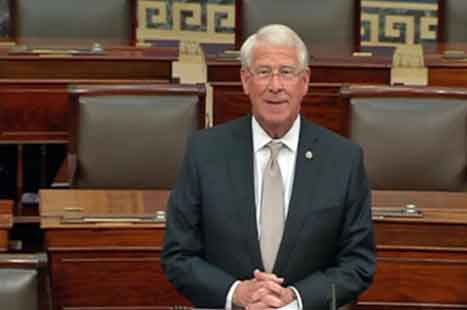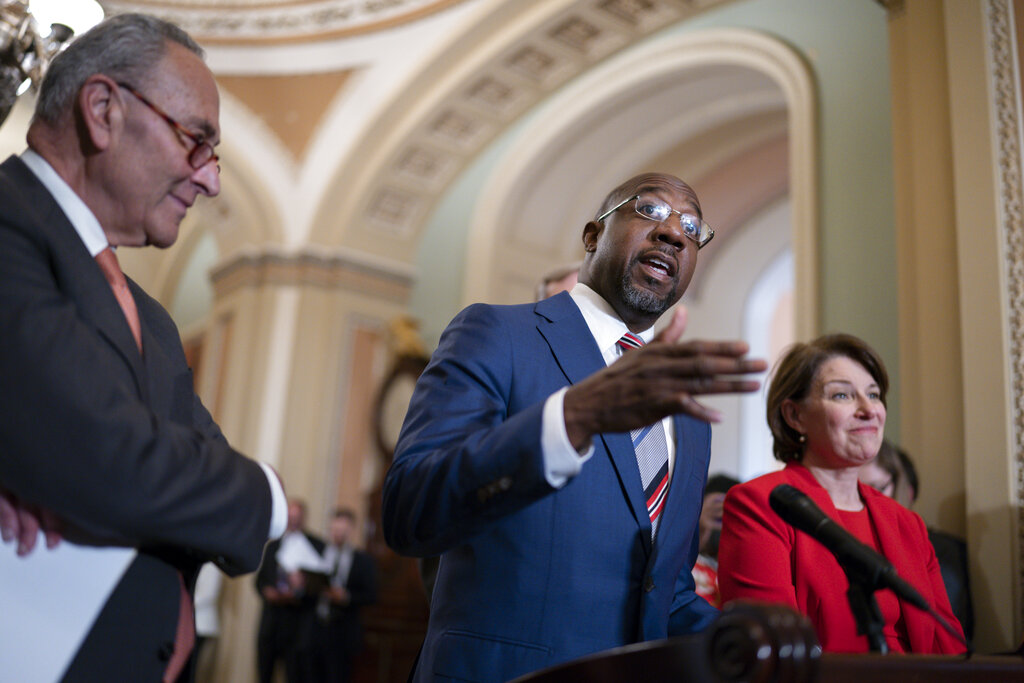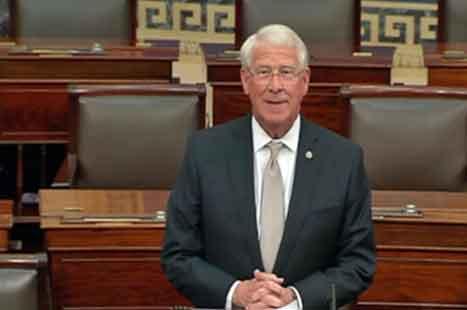WASHINGTON (AP) — The Democrats' sweeping attempt to rewrite U.S. election and voting law suffered a major setback in the Senate Tuesday, blocked by a filibuster wall of Republican opposition to what would be the largest overhaul of the electoral system in a generation.
The vote leaves the Democrats with no clear path forward, though President Joe Biden declared, “This fight is far from over.”
Sen. Shelley Moore Capito called the bill “a despicable, disingenuous attempt to strip states of their constitutional right to administer elections" that "should never come close to reaching the president’s desk.”
The bill, known as the For the People Act, would touch on virtually every aspect of how elections are conducted, striking down hurdles to voting that advocates view as the Civil Rights fight of the era, while also curbing the influence of money in politics and limiting partisan influence over the drawing of congressional districts.
But many in the GOP say the measure represents instead a breathtaking federal infringement on states’ authority to conduct their own elections without fraud — and is meant to ultimately benefit Democrats.
It failed on a 50-50 vote after Republican denied Democrats the 60 votes needed to begin debate under Senate rules. Vice President Kamala Harris, the first Black woman to hold her office, presided over the chamber as the bill failed to break past that filibuster barrier.
Biden praised Senate Democrats for standing together “against the ongoing assault of voter suppression that represents a Jim Crow era in the 21st Century." In a statement from the White House, he said that in their actions, though unsuccessful on Tuesday, they “took the next step forward in this continuous struggle.”
The rejection forces Democrats to reckon with what comes next for their top legislative priority in a narrowly divided Senate. They've touted the measure as a powerful counterweight to scores of proposals advancing in GOP-controlled statehouses making it more difficult to vote.
“Once again, the Senate Republican minority has launched a partisan blockade of a pressing issue," Senate Majority Leader Chuck Schumer said from the chamber floor. He vowed that the vote was the “starting gun” and not the last time voting rights would be up for debate.
Whatever Democrats decide, they will likely be confronted with the same challenge they faced Tuesday when minority Republicans used the filibuster — the same tool that Democrats employed during Donald Trump’s presidency — to block consideration of the bill.
Mississippi Senator Roger Wicker (R) shared on the senate floor:
"Mr. President, I, too rise in opposition to S.1 and urge a no vote. The bill that the Senate will be asked to consider today is a truly radical piece of legislation. It turns out, because of that, it is an unpopular piece of legislation – the kind of bill the Senate was created to help stop from becoming law.
S.1 seeks to transform the way we do elections in this country – and to do so on a narrow, partisan basis. Here’s what Americans need to understand about this legislation.
First, it would strip away the power of the states to run elections and hand it to the federal government, showing a complete lack of trust in local and state leadership.
It would also spend millions of taxpayer dollars to help politicians run ads for their campaigns. Taxpayers would suddenly have to finance partisan messages they may strongly disagree with, raising serious First Amendment questions. S.1 would nullify sensible voter ID laws across the country, including voter identification laws in predominantly Democrat states like Connecticut and Delaware. The legislation would also give the federal government the right to draw congressional district lines, even though states have done this since the beginning of our Republic.
At its root, this bill is based on a myth. And I consider my words here, Mr. President, it is based on a lie. And that lie is that voting rights are somehow under attack in states like Georgia and Texas. This is utterly absurd, and I think the voters in those states understand that. The election reforms recently passed in Georgia, for example, have actually expanded access to the ballot box – making it easier to vote, but also making it harder to cheat.
The new Georgia law does this, among other things. It expands the window for early voting. The new Georgia law allows no-excuse mail-in voting to continue. It adds 100 new ballot drop boxes. It allows voters to get a government-issued ID for free. And it also increases transparency in elections – for example, making sure the ballot counting does not stop in the middle of the night, as we’ve seen in past elections. These reforms are entirely reasonable and widely popular across America and were based on broad input from local stakeholders.
My colleagues who are pushing S.1 say they are trying to save democracy, but, in fact, the bill would actually harm democracy. S.1 would undermine the security of the ballot box, causing more and more Americans to question the outcome of our elections. We should be working to strengthen trust in democracy, not weaken it. Mr. President, the only thing bipartisan about this bill is the opposition to it."

Overall, Republicans showed no sign of yielding.
Republican leader Mitch McConnell called the bill a “a solution looking for a problem” and vowed to “put an end to it.” Texas Sen. Ted Cruz dismissed it as "partisan legislation, written by elected Democrats, designed to keep elected Democrats in office.”
And, more graphically, Sen. Shelley Moore Capito called the bill “a despicable, disingenuous attempt to strip states of their constitutional right to administer elections" that "should never come close to reaching the president’s desk.”
Pressure has been mounting on Democrats to change Senate rules or watch their priorities languish. A group of moderate Democratic senators, however, including Sens. Joe Manchin and Kyrsten Sinema, have ruled that out, denying the votes needed to make a filibuster change.

Biden has vowed what the White House calls the “fight of his presidency” over ensuring Americans’ access to voting. But without changes to Senate rules, key planks of his agenda, including the voting bill, appear stalled.
Sen. Raphael Warnock, a Georgia Democrat and senior pastor at the Atlanta church Martin Luther King Jr. once led, called minority Republicans’ willingness to prevent debate on the voting bill a “dereliction” of duty.
“What could be more hypocritical and cynical than invoking minority rights in the Senate as a pretext for preventing debate about how to preserve minority rights in the society,” Warnock said during a floor speech Tuesday.
The changes being enacted in many Republican states are decried by voting rights advocates who argue the restrictions will make it more difficult for people to cast ballots, particularly minority residents who tend to support Democrats. Republicans, cheered on by Trump, talk instead about fighting potential voting fraud and say the Democrats' concerns are wildly overblown.
As the Senate discussion churns, more changes could be coming to the bill.

Democrats want to protect against intimidation at the polls in the aftermath of the 2020 election. They propose enhancing penalties for those who would threaten or intimidate election workers and creating a “buffer zone” between election workers and poll watchers, among other possible changes.
They also want to limit the ability of state officials to remove local election officials. Georgia Republicans passed a law earlier this year that gives the GOP-dominated Legislature greater influence over a state board that regulates elections and empowers it to remove local election officials deemed to be underperforming.
But Democrats have divisions of their own. Until Tuesday, it wasn't even clear that they would be united on the vote to bring the bill up for debate. Manchin, a moderate from West Virginia, announced earlier this month that he couldn't support the bill because it lacked Republican support.
Manchin flipped his vote to a “yes” after Democrats agreed to consider his revised version. His proposal was endorsed by former President Barack Obama and called a “step forward” by Biden's administration.
Manchin has proposed adding provisions for a national voter ID requirement, which is anathema to many Democrats, and dropping a proposed public financing of campaigns.
Those changes did little, however, to garner the bipartisan support Manchin was hoping for. Senate Republicans said they would likely reject any legislation that expands the federal government's role in elections. McConnell dismissed Manchin's version as “equally unacceptable.”
Sen. Lisa Murkowski, a moderate Alaska Republican, said some aspects of the Democratic bill were laudable and she supports other voting rights legislation, like a reinstatement of the Voting Rights Act struck down by the Supreme Court in 2013.
But, ultimately, she said the “sprawling” bill amounted to “a one-size-fits-all mandate coming out of Washington D.C.” that "in many cases doesn’t work.”
Months in the making, Tuesday’s showdown had taken on fresh urgency as Trump continues to challenge the outcome of the 2020 election and new limits move ahead in Republican-led states.
State officials who certified the results of the 2020 election have dismissed Trump’s claims of voter fraud, and judges across the country have thrown out multiple lawsuits filed by Trump and his allies. Trump’s own attorney general said there was no evidence of widespread fraud that would change the outcome.
